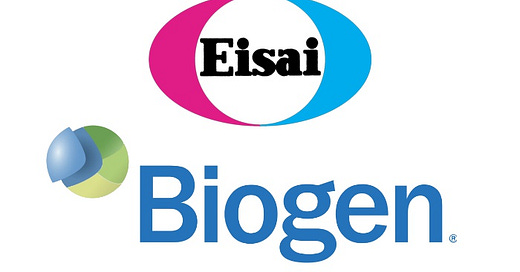FDA grants accelerated approval for Lecanemab (Leqembi), even after the multitude of controversies hitting both the FDA and Biogen
All this even after criticisms of futility for Aducanumab. even after evidence of malfeasance from the FDA, and even after fraudulent findings in Alzheimer's research warrant an overhaul to the field.
Cover image from Drug Delivery Business
With a flick of a wrist the FDA has granted accelerated approval to Lecanemab (marketed as Leqembi), an anti-amyloid immunotherapy developed by Biogen with a partnership with Eisai intent on slowing down the progression of Alzheimer’s.
With the FDA noting the following in regards to this fast-tracked approval:
Leqembi was approved using the Accelerated Approval pathway, under which the FDA may approve drugs for serious conditions where there is an unmet medical need and a drug is shown to have an effect on a surrogate endpoint that is reasonably likely to predict a clinical benefit to patients. The results of a Phase 3 randomized, controlled clinical trial to confirm the drug's clinical benefit have recently been reported and the agency anticipates receiving the data soon.
As many readers have been made aware of by now, Biogen has come under heavy scrutiny for their other anti-amyloid therapy Aducanumab, which came under fire for lack of futility and high cost, with several members of the FDA committee quitting over the therapy’s approval:
The following article covers other topics, but it also provide a quick glance into Aducanumab as well:
It was because of these controversies that I raised criticisms against Lecanemab, as if somehow Biogen was given a free pass with Aducanumab and can now start cleanly with a new drug. But Lecanemab’s initial results came about when the entire field of Alzheimer’s research came under scrutiny, as some of the groundbreaking research in the field appeared to be fraudulent:
And remember, right before the new year a congressional committee came out with a report stating that many “behind-the-scenes” discussions were happening between FDA members and Biogen, and that Biogen was intent on selling their therapy for exorbitant prices including directing advertisement towards disadvantaged communities:
Apologies for readers who may find all of this redundant, but I continue to highlight all of these facts because I find it frustrating that none of these have come about in the discourse, but that these are just things to be glossed over.
In reading a few mainstream outlets1 many just hint at the fact that Biogen had prior controversies, but move right along in discussing Lecanemab, as if to say that members of the FDA having direct discussions with the pharmaceutical industry in order to get the drug approved is not something worth criticizing.
Who’s to say that part of this communication between Biogen may have utilized in order to get accelerated approval of Lecanemab? How can the FDA not understand the optics of allowing accelerated approval even after members were caught engaging in communications to aid Aducanumab’s approval process?
It’s as if to say that a pharmaceutical company caught engaging in activities that many in the public would castigate can now be given not one, but two chances at preying on the public for their want of an Alzheimer’s treatment.
But also, how are we as the public to know whether the people who were part of the approval of Aducanumab were also not the same people involved with Lecanemab’s approval? Are we to assume that the ones engaging in malfeasance are not involved with Lecanemab’s review process? Or do we just disregard any continuing ties?
There are many issues with this accelerated approval, but the fact that the FDA can continue to pull one over the public—with the general public’s approval I might add— suggests that these approvals will continue regardless of whether they show any benefit, and regardless of their adverse reactions.
This is a sign that accelerated approval will continue to obfuscate traditional processes, backed by those with connections to the FDA to learn how to maneuver the new accelerated approval landscape.
So today Alzheimer’s therapies, then anything else in the near future, all done without a care for the public’s safety.
The Guardian and Reuters don’t make much mention about these controversies. Interestingly, the Canadian outlet CBC provides some pushback noting Aducanumab’s controversies, although again the fact that many outlets can report on the congressional committee report and still not incorporate that into reports is ludicrous.






This takes a lot of effort and a sharp eye to keep track of these and present it to us. Thank you for your work.
I’m a bit confused- wasn’t the first drug found to not be effective because the root cause of Alzheimer’s is still unknown (eg its not the plaque build up?) And hence, the first drug was dangerous and ineffective and this second drug makes the same assumption that Alzheimer’s is from plaque build up, when it isn’t? Isn’t this a parallel to antidepressants where they had to admit that low serotonin levels are not the root cause of depression and they don’t know exactly what antidepressants do? Disclaimer- not sure I even understood those concepts correctly either...